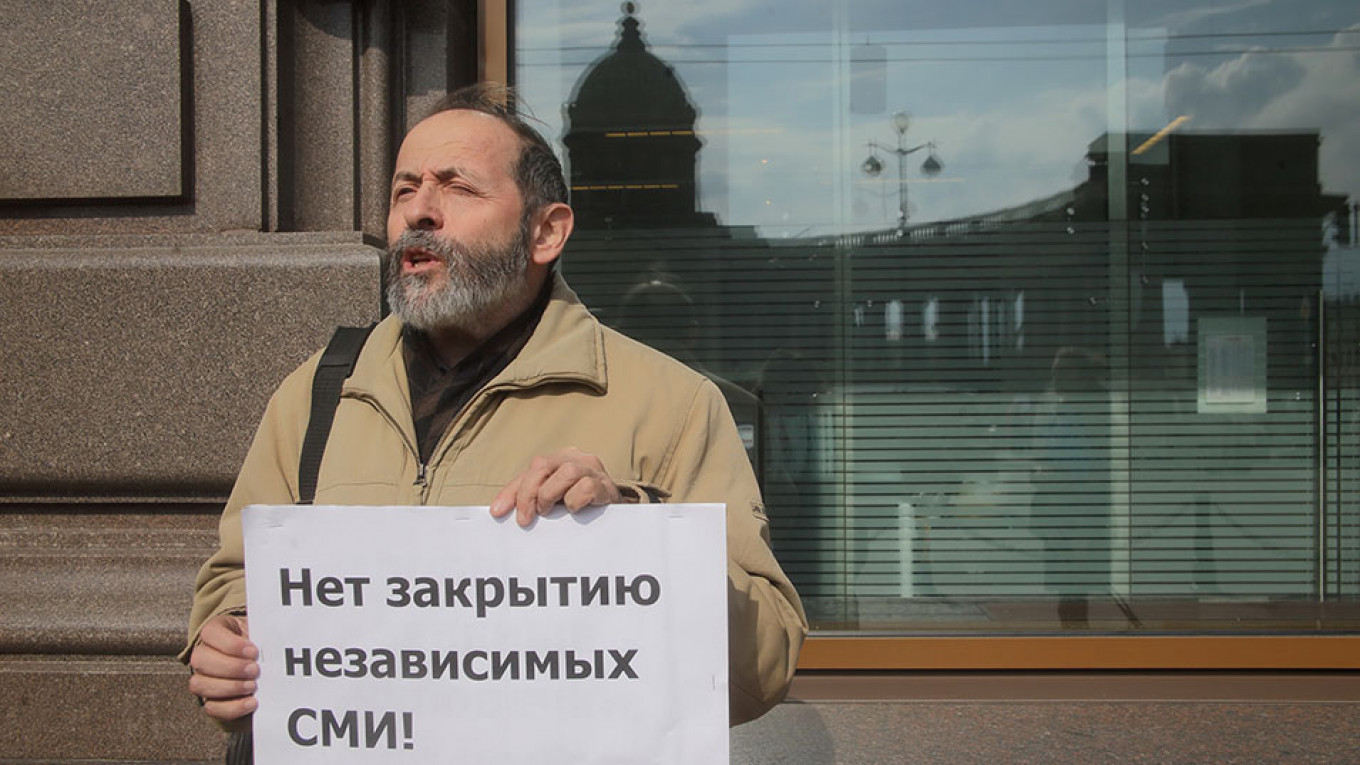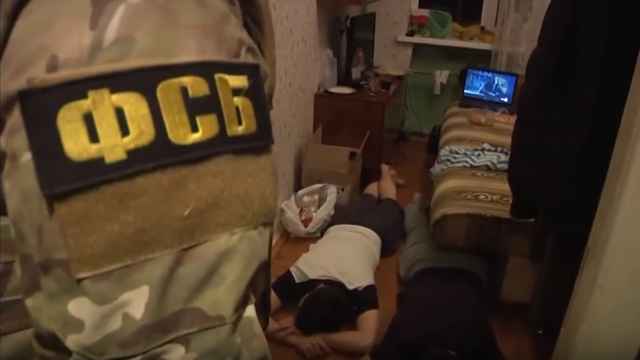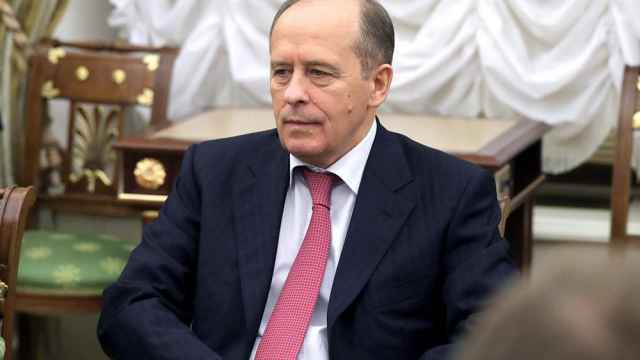The first story accusing St. Petersburg’s most vocal opposition politician, Boris Vishnevsky, of sexual harassment appeared in early November on the pro-government Nation News website. Since then, the 64-year-old deputy from the liberal Yabloko party has faced near-daily reports calling him a “sex terrorist” and a “pedophile.”
The allegations have hit a nerve in Russia, where sexual harassment in workplaces and universities often goes unreported because victims are afraid of repercussions and the complex legal system means perpetrators often escape prosecution.
But observers say the allegations against Vishnevsky are part of a carefully coordinated smear campaign by a pro-Kremlin media group that is notorious for spreading fake news against opponents of the government.
“The campaign has been aimed at personally discrediting Vishnevsky, who has always been an inconvenient deputy consistently opposing the city’s administration and governor,” Pyotr Bystrov, a local independent political consultant, told The Moscow Times.
“But the evidence they’ve used has been so poorly thought out that the allegations against him are farcical,” he added.
Troll factory links
Nation News website said Nov. 7 it had received a letter from a young woman called Kristina who had studied at St. Petersburg’s Herzen University, where Vishnevsky teaches political science.
In her letter, Kristina said that she — along with four other female students, some of whom were underage — had been sexually harassed by Vishnevsky in 2014. The alleged victim went on to say that Vishnevsky had largely preyed on first-year university students who were afraid to speak out against him.
“Vishnevsky has already ruined many lives, but he’s feared and that’s why no one has spoken out,” the letter said.
In the days that followed, Nation News published a video interview with the alleged victim, whose face was blurred out, while another organization called the Federal News Agency (FAN) said it had received a letter from a second victim named Alina, who also said she had been sexually harassed by Vishnevsky.
Both Nation News and FAN are part of a single network — the Patriot media group. Yevgeny Prigozhin, the alleged mastermind behind Russia’s notorious “troll factory,” the Internet Research Agency, appears on official documents as head of Patriot’s board of trustees.
Facebook deleted hundreds of FAN-linked accounts last year after concluding that it was “controlled and operated by” the Internet Research Agency and had “repeatedly acted to deceive people and manipulate people around the world,” Mark Zuckerberg told Reuters in April 2018.
A 2017 investigation by the RBC news website found that FAN had once shared the same office building and technical staff as the troll factory.
Meanwhile, independent Russian journalists investigating the reports against Vishnevsky this month found that the allegations were full of contradictions — the politician had never taught first year students at Herzen University and there had been no Kristina studying political science in 2014.
They also found that the allegations against Vishnevsky were being massively reposted by social media pages with names like “Patriots of Russia” and “The U.S. is the sponsor of world terrorism” — which had been involved in previous pro-government media campaigns in the past.
St. Petersburg’s journalism union issued a statement saying that the allegations spread by the Patriot media group and its affiliates against Vishnevsky were “disinformation” and that the journalists involved had discredited themselves and the profession.
“Unfortunately, this is not the first example of a deceitful and obviously stage-managed informational campaign that is orchestrated by the same media group,” the union said in a statement.
In the aftermath of the scandal, Herzen University, where Vishnevsky has taught since 2013, said that it had looked into the reports and called on any students or alumni with information to come forward.
A university spokesperson told The Moscow Times it has yet to receive a single claim against Vishnevsky.
The university has issued a statement calling the reports being spread by the Patriot media group “fake information.”
The Moscow Times spoke to a dozen young women who have studied in the university’s political science department since Vishnevsky began teaching there. None of them said they had experienced sexual harassment from Vishnevsky, and they all said the stories in Patriot media group publications were the first instances of them hearing reports of this kind of behaviour from the politician.
Vishnevsky himself has unequivocally denied the allegations and says they are revenge for his opposition to the authorities. He has filed a police complaint against the Patriot media group for defamation.
“What’s happening to me is undoubtedly revenge for my political activities, I only view it in these terms,” he told The Moscow Times.
Not the first time
Local journalists who have investigated the activities of the Patriot media group say the allegations against Vishnevsky follow a pattern that is identical to past smear campaigns against other politicians.
“They have a political technologist that develops a media plan, and then the affiliated news organizations mass produce articles based on their schedule,” Ksenya Klochkova, a St. Petersburg investigative journalist, told The Moscow Times.
The articles are then picked up by a network of bloggers and fake social media pages that spread the news, in what is called travlya (a public smear campaign) in Russian.
Lesser-known news websites are paid to publish the articles through an online marketplace, Klochkova said.
Last May, the Patriot media group launched a similar smear campaign against Maxim Reznik, another liberal deputy and government critic in the St. Petersburg Legislative Assembly.
At the time, hundreds of articles accused Reznik of abusing alcohol and drugs and of beating his wife, days after the opposition deputy had led a protest march against St. Petersburg’s Kremlin-appointed governor Alexander Beglov.
The campaign against Reznik was also accompanied by a series of single pickets held by around half a dozen young people in St. Petersburg — another common tactic used by the Patriot media group, according to Klochkova.
Daria Galimova, who picketed against Reznik in May with a sign calling him a marijuana smoker, was also seen at a picket against Vishnevsky earlier this month holding a sign calling him a pedophile.
“I participate in other pickets on topics that I’m troubled by, but for some reason you people only see what you’re interested in,” she said to The Moscow Times in response to a question on why she had showed up at protests against two separate prominent opposition politicians.
She declined to name other pickets she had attended.
According to Klochkova, the picketers are usually students who are recruited and paid to hold a sign for around 500 rubles ($8) by a movement called Generation Z that is coordinated by the Patriot media group. The pickets are used to keep the momentum of the smear campaign going in the media, Klochkova says.
“These people aren’t united ideologically,” Klochkova said. “They’re united by a common opportunity to make money.”
Three other young people who participated in pickets against Vishnevsky earlier this month told The Moscow Times that they had not been paid to participate. Renat Evstingeev, the head of Generation Z, has denied on social media that his organization is behind the pickets.
Why Vishnevsky?
As with Reznik, political observers say that the campaign against Vishnevsky is tied to his vocal opposition views.
Vishnevsky had attempted to run against Beglov in the city’s gubernatorial elections in September but was barred after failing to secure the necessary number of signatures from the city’s municipal deputies, most of whom are members of the ruling United Russia party.
Since then, he has publicly refused to recognize the authority of the new governor and has criticized recent government initiatives to dismantle a popular public park, raise tariffs on public transport and increase funding for law enforcement.
Bystrov, the political consultant, said that such smear campaigns are often designed to provide increased revenue streams for pro-government media.
“I’d say this type of a campaign is designed to simply misappropriate funds given by the client that orders the campaign,” he told The Moscow Times.
Investigative journalists have estimated that previous smear campaigns, like the one against Reznik, cost over 10 million rubles ($156,000).
Vishnevsky says that the police have launched a probe into his complaint against the Patriot media group, which he hopes will result in criminal prosecution for slander.
“Unfortunately, such campaigns of slander and smears by pro-government media are becoming a daily fact of life,” he told The Moscow Times.
“I’m not the first opposition politician who has been targeted and I obviously won’t be the last.”
A Message from The Moscow Times:
Dear readers,
We are facing unprecedented challenges. Russia's Prosecutor General's Office has designated The Moscow Times as an "undesirable" organization, criminalizing our work and putting our staff at risk of prosecution. This follows our earlier unjust labeling as a "foreign agent."
These actions are direct attempts to silence independent journalism in Russia. The authorities claim our work "discredits the decisions of the Russian leadership." We see things differently: we strive to provide accurate, unbiased reporting on Russia.
We, the journalists of The Moscow Times, refuse to be silenced. But to continue our work, we need your help.
Your support, no matter how small, makes a world of difference. If you can, please support us monthly starting from just $2. It's quick to set up, and every contribution makes a significant impact.
By supporting The Moscow Times, you're defending open, independent journalism in the face of repression. Thank you for standing with us.
Remind me later.







